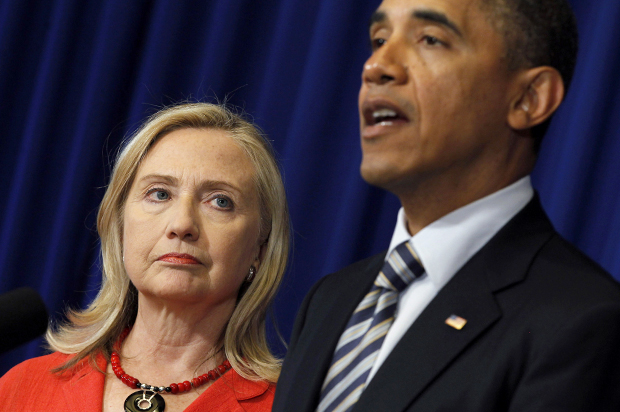The great thing about blowout elections is that, for people on the winning side, they can be appropriated as proof positive that the American people decisively rejected everything you dislike. For conservative pundits like Charles Krauthammer, it was a rejection of “liberalism” writ large. For Tea Party people like Richard Viguerie, last night’s vote was a rejection of the establishment Republican agenda (somehow). Louisiana governor and beefcake heartthrob Bobby Jindal said that voters served up rejections of “progressivism,” “big government” and “Obamacare.” And Rand Paul argued in a series of tweets that the 2014 midterm election was actually a national thumbs-down for one Hillary Rodham Clinton.
Ah yes! Hillary Clinton. How utterly shocking that would-be presidential candidate Rand Paul concluded that the midterms were an indictment of his would-be rival. And just like that, we were all dragged into the 2016 election cycle. Welcome to hell, everyone.
There is no shortage of opinions as to how Hillary and her presumed 2016 ambitions emerged from last night’s Democratic blood bath. National Journal proclaimed her one of the “losers” of the evening. “The midterm results represented a blistering rebuke of Obama, and it’s fantasy to think his former secretary of State and Democratic heir apparent doesn’t feel the second-hand sting.” On the other hand, Yahoo News and the Week argued that Hillary emerged triumphant from the still-smoking electoral wreckage. “The math and the reality of Washington dysfunction favor the presumptive Democratic nominee in 2016,” Yahoo concluded.
But let’s assume that Clinton, the presumptive nominee, does indeed become the actual nominee. This poses an interesting question: The severity of this week’s losses laid bare the political stagnation of the Democratic Party’s economic agenda and the need for a strong progressive realignment – can that happen with Hillary Clinton at the top of the ticket?
With a larger-than-expected GOP Senate majority that threatens to grow even larger as the straggler and runoff races wrap up, the presumption that Clinton will have to ride to the rescue of the Democrats is taking hold. The New Republic’s Brian Beutler put it as bluntly as you could ask for: “Whereas one day ago, Democrats had decent reasons to believe they could recapture the Senate even if Republicans won the White House in 2016, today, they must know that if a Republican wins the presidency, his party will control the entire government.”
That’s a tall order for any Democrat running for the White House after eight years of Democratic rule, and it’s made even more problematic by the fact that the Democrats’ message on the economy clearly isn’t connecting with voters. Whoever gets the nod for 2016 will face the challenge of articulating an economic message that sets them apart from the Obama economic record, which voters are increasingly dissatisfied with. The American Prospect’s Harold Meyerson laid out the big problem facing the Democrats going forward: They can campaign on the improving economy all they like, but the recovery itself is lopsided in favor of the wealthy. “Democrats pointed to the economy’s recent growth, but apparently did so at their own peril: When 95 percent of the income growth since the recovery began goes to the wealthiest 1 percent … reports of a recovery strike most Americans as news from a faraway land.”
What’s needed, Meyerson writes, is a revamping of the Democratic economic agenda so that it emphasizes wage growth, reducing income inequality, wealth redistribution, and taking on the banks. The depth and breadth of the Democratic losses on Election Day only reinforce the need for this change and will light a fire under the party’s progressive base to push for a more populist economic platform. And that will only exacerbate the tensions that already exist between progressives and Hillary Clinton on the economy.
Hillary’s strategy to date has been to try to straddle the divide between Wall Street and the Democratic base, and to distance herself from Obama’s economic record while gently reminding everyone of the boom years her husband presided over. While out on the trail for midterm candidates, she campaigned hard for minimum wage increases and even threw a few elbows at the big banks. The friction lies with her close and ongoing relationships with Wall Street firms that have donated generously to the Clinton Foundation and will likely make large contributions to her campaign war chest as well.
Basically, the issue of Clinton’s credibility as an economic populist has been sharpened by the degree to which public faith in Democratic economic policies has cratered. Democratic electoral success in 2016 and beyond will depend largely on the party’s ability to convince voters that its policy agenda actually emphasizes economic fairness and isn’t just populist window dressing that masks rising inequality. Can Clinton, as the person best positioned to win the nomination, effectively preside over that change? It’s a tough slog, and she has a lot of skepticism to overcome, but she also has a lot of time to make her case.


